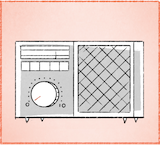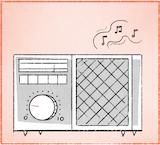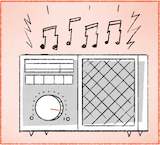


นี้คืออี่หยัง นี้คือวิทะยุ วิทะยุเคี่ยงสีเทา วิทะยุเคี่ยงบ่ใหญ่ วิทะยุเป็นลูบสี่เหลี่ยม
วิทะยุเอาไว้เฮ็ดหญัง วิทะยุเอาไว้ฟังเพง วิทะยุเอาไว้ฟังข่าว
วิทะยุมีลำโพงพ้อม วิทะยุมีปุ่มปับเสียงพ้อม วิทะยุมีปุ่มเปิดกับปิดพ้อม
ขั้นบ่มีปุ่มเปิดและปุ่มปิด วิทะยุกะสิใซ้งานบ่ได้
ตอนนี้วิทะยุปิดหลือเปิด ตอนนี้วิทะยุปิดอยู่ วิทะยุบ่ได้ใซ้งาน ตอนนี้วิทะยุกำลังปิด
วิทะยุใซ้ไฟฟ้าบ่ บ่ วิทะยุเคี่ยงนี้บ่ได้ใซ้ไฟฟ้า วิทะยุเคี่ยงนี้ใซ้ถ่าน
ขั้นบ่มีถ่าน วิทะยุกะใซ้งานบ่ได้ ขั้นวิทะยุมีถ่าน วิทะยุกะใซ้งานได้ปกกะติ
16
นี้คืออี่หยัง นี้คือวิทะยุ วิทะยุเคี่ยงนี้กำลังใซ้งานอยู่ ได้ญินวิทะยุเคี่ยงนี้เปิดเพงอ่มๆ อยู่ สงสัยวิทะยุเคี่ยงนี้กำลังเปิดเพงอยู่
แล้วเปิดเพงอี่หยัง บ่ลู้คือกันจักเขาเปิดเพงอี่หยัง ได้ญินเสียงค่อยๆ ได้ญินเสียงค่อยๆ หนึ่ง
วิทะยุเคี่ยงนี้เปิดเพงเบาแม่นบ่ แม่น วิทะยุเคี่ยงนี้เปิดเพงเบา บ่ได้เปิดเพงแฮง เปิดเสียงค่อยๆ หนึ่ง
17
วิทะยุเคี่ยงนี้กำลังเปิดเพงเสียงดังแม่นบ่ แม่น วิทะยุเคี่ยงนี้กำลังเปิดเพงเสียงดังคัก เปิดดังกะด้อกะเดี้ย เปิดดังบักคักหนึ่ง
เป็นหญังเขาคือเปิดเสียงดัง บ่ลู้คือกัน เขาอาดสิมักฟังเสียงดัง เขากะเลยเปิดเสียงดังกะได้
ขั้นเปิดเพงเสียงดังมันดีบ่ บ่ลู้คือกัน แล้วแต่คนมัก ขั้นคนมักดังแฮงๆ เขากะสิเปิดเสียงแฮงๆ ขั้นคนใดมักฟังเสียงค่อยๆ เขากะสิเปิดค่อยๆ
แต่ว่าขั้นคนใดบ่มักเปิดแฮง แล้วมาเปิดแฮง เขากะบ่มัก เขาอาดสิลำคาน หลือเป็นตาหน่ายกะได้
Link to overview page
Link to dictionary
| Isaan | Pronunciation | Tones | Thai | English/Notes |
|---|---|---|---|---|
| นี้ | ni: | HF | นี้ | 1. this 2. here |
| คือ | khʉ: | HR | คือ | 1. to be, to resemble, like, as 2. why {บักหล้าคือบ่เก็บโต่ะแน่ = [addressing a young boy] Why haven't you cleared the table?} |
| อี่หยัง | i:-yaŋ | H-M | อะไร | 1. what {นี้คืออี่หยัง = What is this?} {มื้อนี้เจ้าเฮ็ดอี่หยัง = What are you doing today?} {กินเข้างายกับอี่หยัง = What did you have for breakfast?} 2. something, anything, (in negations) nothing {บ่ต้องเฮ็ดอี่หยังอีกเลยนอกจากใส่ปุย = [we] don't need to do anything besides adding fertilizer} |
| วิทะยุ | wi-tha-yu | H-H-H | วิทยุ | radio |
| เคี่ยง | khi:aŋ | H | เครื่อง | 1. machine, engine 2. clf. for machines, airplanes, electronic devices etc. Notes: pronunciation: also realized as เคื่อง |
| สี | si: | M | สี | 1. color 2. colored pencil, crayon |
| เทา | thao | HR | เทา | grey |
| บ่ | bɔ: | H | ไม่ | 1. no, not 2. question particle, transforming a statement into a question Notes: spelling exception in line with common usage on social media |
| ใหญ่ | ɲai | H | ใหญ่ | large, big |
| เป็น | pen | M | เป็น | 1. to be, to exist 2. to be able to 3. to suffer, sth. happens to 4. เป็นหญัง[...]คือ in initial position: why? {เป็นหญังเขากะคือแปงฟัน = Why is he brushing his teeth?} {เป็นหญังเคี่ยงบินมันคือสิตก = Why is the airplane falling down?} |
| ลูบ | lu:p | HF | รูป | 1. picture, image, photo 2. form, shape 3. clf. for pictures, images, photos |
| สี่เหลี่ยม | si:-li:am | H-H | สี่เหลี่ยม | rectangle, square |
| เอา | ao | M | เอา | to take, to give {เขากำลังเอาก่องไปซั่ง = he's taking the boxes to weigh them} {หมอกำลังเอายาให้คนป่วยกิน = the doctor is giving medicine to the patient} {เอาไว้ถ้า = is for, is used for, has the purpose of} |
| ไว้ | wai | HF | ไว้ | 1. to keep, to put, to place, to retain, to save, to reserve {เขาเอาหัวของเขาไว้ใส = Where does she put her head?} {หมาสิเลี้ยงไว้บ้าน = dogs are kept/raised in the house} {ไก่เลี้ยงไว้ในคอก = chicken are kept/raised in a coop} {หน้ามันบังไว้ = the face is covered/not visible} {เขาเอาโทละสับวางไว้หู = he holds the phone to his ear} 2. for {นาลิกาปุกมีไว้เฮ็ดหญัง = What is an alarm clock for?} {หม้อเอาไว้เฮ็ดแนวกิน = a pot is used to make food} {ก่องเอาไว้เฮ็ดหญัง ก่องเอาไว้ใส่ของ = What is the box for? It's for putting in stuff.} Notes: see also ไว้ถ้า |
| เฮ็ด | het | H | ทำ | to do, to make |
| หญัง | ɲaŋ | M | อะไร, เป็นหญัง = ทำไม | 1. what {เขากำลังเฮ็ดหญัง = What is he doing?} {ธูปเอาไว้เฮ็ดหญัง = What are incense sticks for?} 2. something, anything, (nothing) 3. เป็นหญัง[...]คือ in initial position: why {เป็นหญังเขาคือใส่บักพิกลงไปในกวยเตียว = Why is he putting chili in [his] noodle soup?} {เป็นหญังหน้าต่างมันคือเปิด = Why is the window open?} {เป็นหญังมันคือมีควนไฟ = Why is there smoke?} |
| ฟัง | faŋ | HR | ฟัง | to listen, to hear |
| เพง | phe:ŋ | HR | เพลง | 1. song 2. music |
| ข่าว | kha:o | H | ข่าว | news |
| มี | mi: | HR | มี | 1. to have 2. there is |
| ลำโพง | lam-pho:ŋ | HR-HR | ลำโพง | loudspeaker |
| พ้อม | phɔ:m | HF | พร้อม | at the same time, also, too {มีตะเว็นพ้อม = the sun's out, too} {กะทะมีด้ามพ้อม = the pan has also a handle} |
| ปุ่ม | pum | H | ปุ่ม | button |
| ปับ | pap | M | ปรับ | to adjust, to regulate |
| เสียง | si:aŋ | M | เสียง | 1. sound, noise 2. tone, voice |
| เปิด | pə:t | M | เปิด | 1. to open {เปิดหน้าต่าง = to open the window} {เปิดปะตู = to open the door} 2. to start, to switch on {เปิดไฟ = to switch on the light} {เปิดแอ = to switch on the A/C} |
| กับ | gap | M | กับ | 1. and {ลุงกับป้า = uncle and aunt} {กวยเตียวหมูกับกวยเตียวไก่ = noodle soup with pork and noodle soup with chicken} 2. with, to {ค้ายๆ กับคำว่า ... = similar to the word ...} 3. prefix in front of foods {กับเข้า = side dishes eaten with rice} {เขากินกับกวยเตียว = he's eating noodle soup} |
| ปิด | pit | M | ปิด | 1. to close {ปิดปะตู = to close the door} {ปิดก่อกน้ำ = to close the tap} 2. to finish, to switch off {ปิดไฟ = to switch off the light} {ปิดวิทะยุ = to switch off the radio} |
| ขั้น | khan | LF | เมื่อ | when, if |
| และ | lɛ | H | และ | and |
| กะ | ga | M | ก็ | 1. then, consequently 2. also |
| สิ | si | M | จะ | future tense auxiliary {เขากำลังสิตื่น = he's about to wake up} {สิไปตะหลาด = [I'm] going to the market} |
| ใซ้งาน | sai-ŋa:n | HF-HR | ใช้งาน | to use, to put to use |
| ได้ | dai | HF | ได้ | 1. can 2. to get, to obtain 3. before verb: indicating past tense 4. บ่ได้ + verb: not |
| ตอนนี้ | tɔ:n-ni: | M-HF | ตอนนี้ | now |
| หลือ | lʉ: | M | หรือ | or |
| อยู่ | yu: | H | อยู่ | 1. to be (located) at 2. yet, still 3. auxiliary indicating continuous or progressive action {ทอดปาอยู่ในกะทะ = (in the process of) frying a fish in the pan} {แม่กำลังเมี้ยนเฮียนอยู่ = mother is cleaning/tidying up the house} |
| กำลัง | gam-laŋ | M-HR | กำลัง | auxiliary indicating continuous or progressive action |
| ใซ้ | sai | HF | ใช้ | to use |
| ไฟฟ้า | fai-fa: | HR-HF | ไฟฟ้า | electricity |
| ถ่าน | tha:n | H | ถ่าน | battery (e.g., for radio) |
| ปกกะติ | pok-ga-ti | M-M-M | ปกติ | 1. normal, usual 2. normally, usually |
| ได้ญิน | dai-ɲin | HF-HR | ได้ยิน | to hear |
| อ่มๆ | om | H | gently, softly Notes: translation to be confirmed; see also อึ่มๆ, ฮึ่มๆ |
|
| สงสัย | soŋ-sai | M-M | สงสัย | to suspect, to wonder, to ask oneself |
| แล้ว | lɛ:o | HF | แล้ว | 1. finished 2. already 3. and then, and next (especially แล้วกะ) 4. auxiliary for past tense |
| ลู้ | lu: | HF | รู้ | 1. to know 2. to understand Notes: equivalent to ฮู้ |
| คือกัน | khʉ:-gan | HR-M | เหมือนกัน | 1. also, likewise, similarly {ยินดีที่ได้ฮู้จักคือกันคับ = Nice to meet you too!} 2. in negative sentences: either {บ่ลู้คือกัน = I don't know either} {จักคือกัน = I don't know (either)} |
| จัก | jak | M | จัก | 1. answer to a question: [I] don't know, don't know exactly, [I'm] not sure {พุซายคนนี้เขาเถ้าไป่ จัก จักเถ้าหลือบ่เถ้า เบิ่งบ่ค่อยออก = Is this man here already old? I don't know. I can't see clearly whether he's old or not.} {เขาเว้ากันอยู่ใส จักคือกัน = Where are they talking? I don't know either.} 2. exact(ly), what exactly {จักต้มอี่หยังกะบ่ฮู้ = I don't know what (exactly) he is cooking} {บ่ลู้คือกันจักปาอี่หยัง = I don't know either what kind of fish this is} 3. how much/many? {ต้นไม้มีจักต้น = How many trees are there?} {ตอนนี้จักโมงแล้ว = What time is it now?} {มือของเฮานี้สิมีจักนิ้ว = How many fingers do our hands have?} 4. a bit, a little bit {จักหน่อย/จักหน่อยหนึ่ง = a bit, a little bit} |
| เขา | khao | M | เขา | personal pronoun: he, she |
| ค่อย | khɔ:i | H | ค่อย | 1. soft, gentle 2. little by little, gradually |
| หนึ่ง | nʉŋ | H | หนึ่ง | 1. one 2. after adjective: intensifier {บักคักหนึ่ง = very much} {อันบักใหญ่หนึ่ง = very large}, or attenuates the meaning {กะดาดมันแผ่นน้อยๆ หนึ่ง = the piece of paper is [relatively] small} |
| เบา | bao | M | เบา | 1. weight: light 2. soft, gentle 3. volume: quiet/not loud {เปิดเพงเบาๆ = to switch on/listen to a song at moderate volume} |
| แม่นบ่ | mɛ:n-bɔ: | H-H | ใช่ไหม | question particle: ..., right? ..., isn't it? ..., don't you? etc. {เจ้าได้เห็นสิ่งนั้นแม่นบ่ = You've seen that, haven't you?} {ฝนกำลังตกแม่นบ่ = It's raining, isn't it?} {นี้คือกะคุแม่นบ่ = This is a bucket, isn't it?} |
| แม่น | mɛ:n | H | ใช่ | 1. yes 2. affirmative particle |
| แฮง | hɛ:ŋ | HR | แรง | 1. strong {ลมกำลังพัดแฮงอยู่ = to wind is blowing strongly} 2. loud {เสียงแฮง = loud} 3. strength, power |
| เสียงดัง | si:aŋ-daŋ | M-M | เสียงดัง | loud |
| คัก | khak | H | intensifier: very, very much | |
| ดัง | daŋ | M | ดัง | 1. noise/music etc.: loud 2. to make a noise, to ring, to go off etc. {นาลิกาปุกมันกะสิดังขึ้น = the alarm clock will go off} |
| กะด้อกะเดี้ย | ga-dɔ:k-ga-di:a | M-HF-M-HF | มากมาย, มากเกินไป | intensifier: very, very much |
| บักคักหนึ่ง | bak-khak-nʉŋ | M-H-H | intensifier: very, very much (variant of คัก) | |
| อาด | a:t | LF | อาจ | 1. might, may, will 2. likely |
| มัก | mak | H | ชอบ | to like, to love, to want, to desire |
| เลย | lə:i | HR | เลย | 1. futher on, beyond, past {เข็มน้อยเลยเลขสิบสองไป = the minute hand has passed number twelve} 2. too much 3. at all 4. definitively 5. completely, utterly |
| มัน | man | HR | มัน | it (also used to refer to people) |
| ดี | di: | M | ดี | good |
| แล้วแต่ | lɛ:o-tɛ: | HF-H | แล้วแต่ | up to, depending on |
| คน | khon | HR | คน | person, people |
| ใด | dai | M | ใด | 1. which, that one which, what, how {เขานั่งแบบใด เขานั่งขดตะหมาดอยู่ = How is he sitting? He's sitting cross-legged.} {ตอนใด = when?} 2. whichever, whoever {หม้องใดหม้องหนึ่ง = some place, somewhere} {ขั้นเฮาอยากตื่นญามใด เฮากะตั้งเวลาปุกญามนั้น = If we want to get up at a certain time, we set the alarm to that time} Notes: sentence-final often with a marked rising tone |
| แต่ว่า | tɛ:-wa: | H-H | แต่ว่า | 1. but 2. only {ฮู้แต่ว่าเขายืนอยู่พุเดียว = I only know that he's standing there by himself} |
| มา | ma: | HR | มา | 1. to come 2. auxiliary expressing action towards the present or focal time {กะคุเฮ็ดมาจากอี่หยัง = What is the bucket made of?} {แล้วเขากะเก็บเงินจากพุนั้นมา = and then she takes the money of that person} |
| ลำคาน | lam-kha:n | HR-HR | รำคาญ | to feel annoyed, to get annoyed |
| ตาหน่าย | ta:-na:i | M-H | น่าเบื่อ, น่าเกลียด | to dislike, to detest |